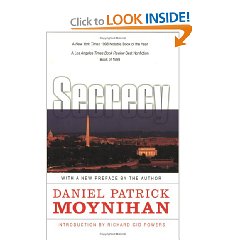The Single Best Examination of Secrecy Costs, October 16, 2008
Daniel Patrick Moynihan
I testified to this Commission, both publicly and also in a private session in the office of Daniel Patrick Moynihan (RIP).
This is the single best non-partisan overview of the costs of unnessary secrecy, as well as the imperatives of providing proper definition and protection of necessary secrets.
I note with appreciation that my testimony led him to include the words “open source” in his cover letter of transmittal to the White House.
See also:
Nation of Secrets: The Threat to Democracy and the American Way of Life
Secrecy: The American Experience
Secrets: A Memoir of Vietnam and the Pentagon Papers
For a sense of the logical implementation of the findings of this Commission, see THE SMART NATION ACT: Public Intelligence in the Public Interest.
For a sense of how we must radically alter the “closed circle” of national intelligence to embrace the entire Nation and indeed the Whole Earth, see Collective Intelligence: Creating a Prosperous World at Peace.



